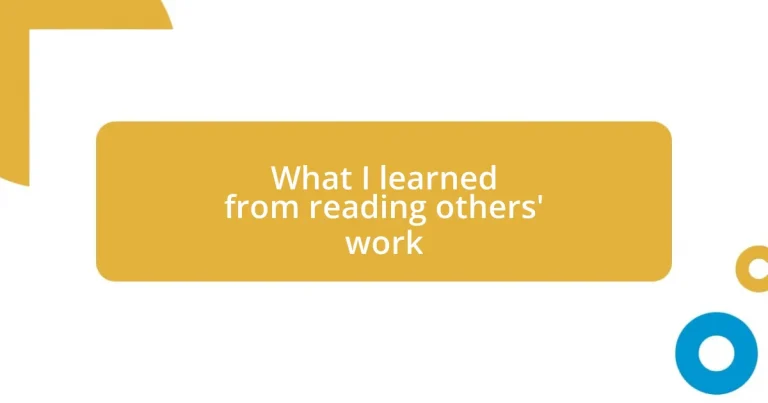Key takeaways:
- Reading enhances empathy and broadens perspectives, allowing individuals to reflect on their own experiences and beliefs.
- Identifying learning opportunities in texts encourages self-improvement and personal growth, transforming challenges into lessons.
- Sharing insights from reading fosters community and deepens understanding, enriching both individual and collective experiences.
- Creating a comfortable reading habit and discussing books with others can significantly enhance engagement and appreciation for literature.
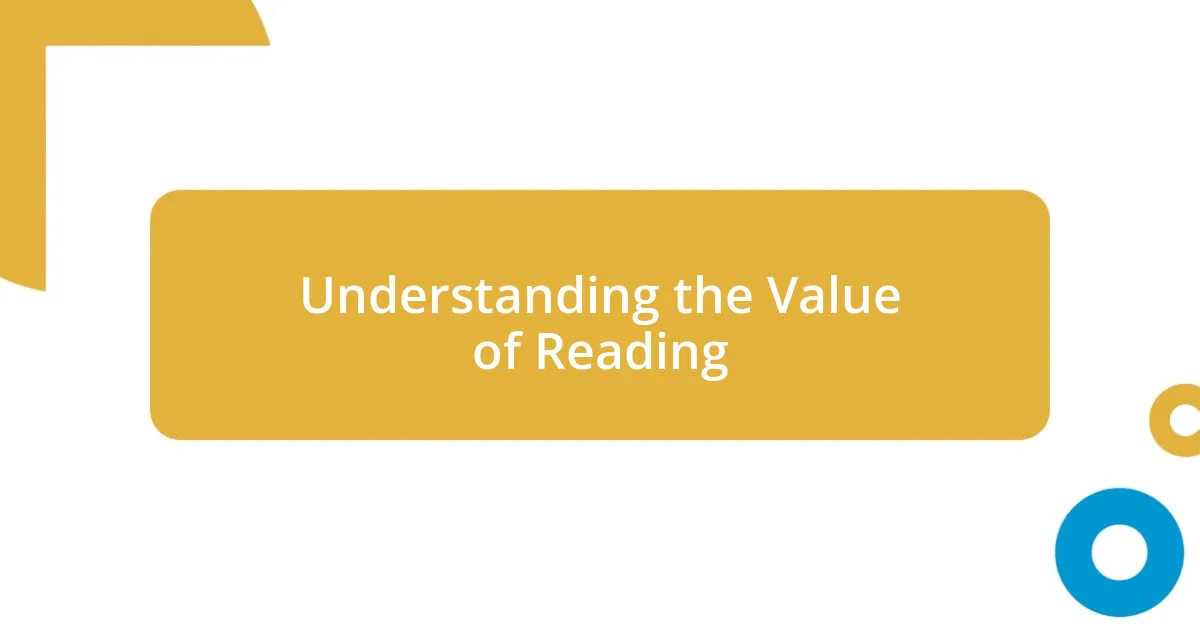
Understanding the Value of Reading
Reading is more than just a pastime; it’s a gateway to understanding diverse perspectives. I vividly remember the first time I delved into a memoir by a writer from a completely different culture. It opened my eyes to experiences I had never considered, making me ask myself: How often do I step outside my own narrative? Engaging with others’ stories enriches our empathy and broadens our worldviews.
Whenever I finish a thought-provoking book, I feel a surge of inspiration, as if I’ve had a heartfelt conversation with an old friend. One evening, while reading a historical novel, I found myself lost in the emotions of the characters, which triggered memories of my own family’s history. It’s fascinating how words can bridge the gap between eras and experiences, prompting deep reflections on who we are and where we come from.
The value of reading also lies in its power to challenge our beliefs. I often find myself questioning my views while engaging with contrasting opinions in non-fiction. Has there ever been a book that made you rethink your thoughts? I believe those moments of cognitive dissonance are vital; they stretch our intellectual boundaries and encourage growth. In this way, reading isn’t just about enjoyment; it’s a transformative journey that shapes our very core.
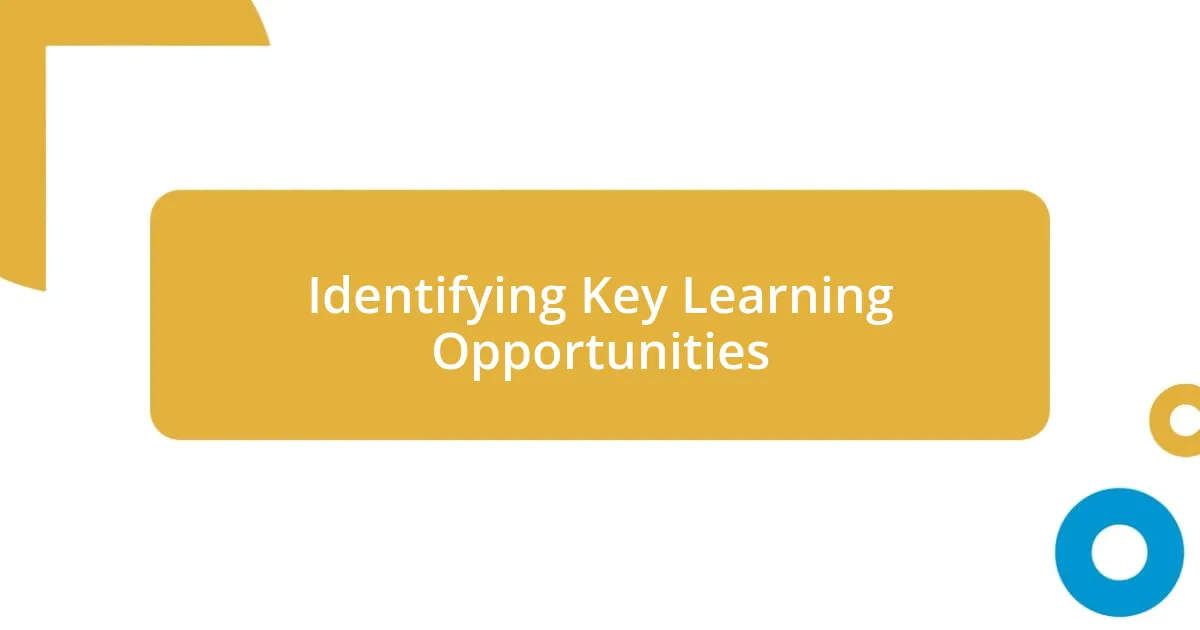
Identifying Key Learning Opportunities
Identifying key learning opportunities when reading others’ work has always been a game changer for me. I remember the time I stumbled upon a research paper that discussed the psychology behind effective communication. It wasn’t just informative; it forced me to reflect on my communication style and consider how I could enhance it. I found myself taking notes, eager to apply those insights in my daily interactions. This experience prompted me to actively search for writings that challenge my current methods and beliefs.
It’s crucial to approach reading with an open mind, specifically looking for lessons that resonate with your life. For instance, I once read a self-help book that emphasized the importance of resilience. It articulated failure as a stepping stone to success. It sparked a revelation within me about how I view setbacks—transforming them from deterrents into opportunities for growth. What learning opportunities have you identified in your reading? Embracing this mindset can create a continuous cycle of self-improvement.
Additionally, identifying these opportunities involves paying attention to how others’ narratives parallel your own experiences. I was reading a novel that featured a character overcoming adversity. I felt an emotional connection, which sparked me to reflect on my own challenges. This intersection of experience and insight allowed me to not only relate but also learn how to better navigate my own hurdles. By embracing the lessons woven into narratives, readers can truly unlock valuable learning experiences.
| Aspect | Key Learning Opportunity |
|---|---|
| Communication | Reflect on personal communication styles and apply insights from effective communicators. |
| Resilience | Transform failures into learning experiences and develop a growth mindset. |
| Relatability | Identify personal experiences that mirror those of characters to gain insights into overcoming challenges. |
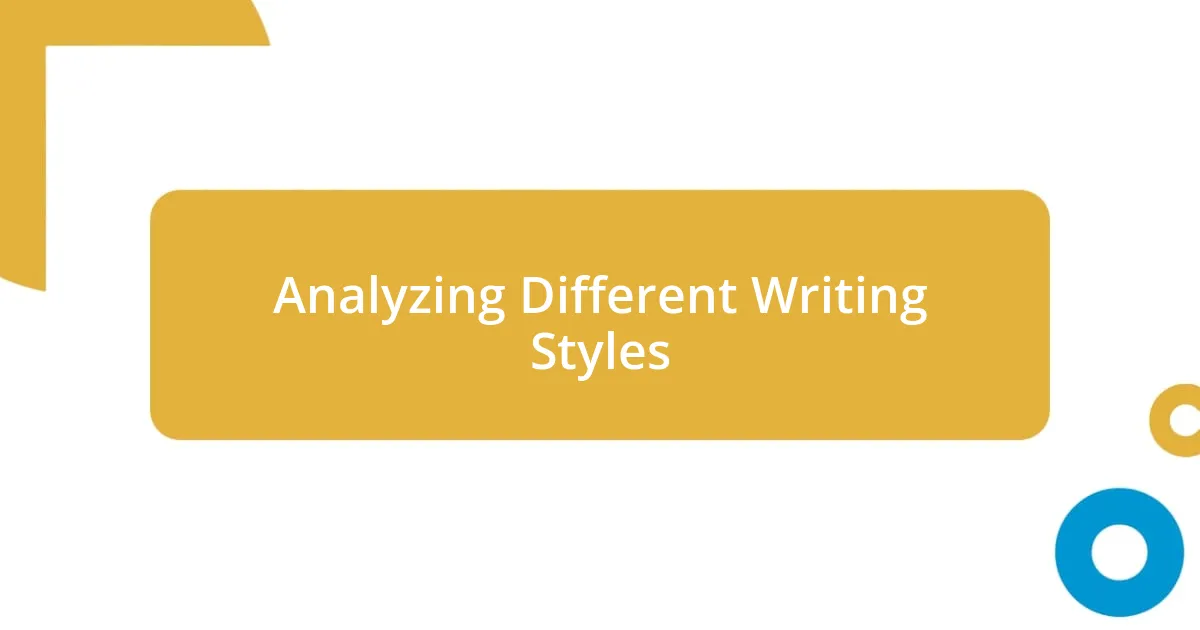
Analyzing Different Writing Styles
When I analyze different writing styles, I often find myself captivated by the unique voice of each author. For instance, I once read a poetry collection where each piece felt like a whispered secret from the author’s heart. That raw vulnerability made me appreciate how varied expressions can connect deeply on an emotional level. It’s remarkable how some writers can evoke such powerful feelings through mere words.
- The use of vivid imagery can transport readers to a different time or place.
- A conversational tone can create a sense of intimacy, making readers feel like they’re in a dialogue.
- Varied sentence lengths can manipulate pacing, enhancing the emotional impact of a moment.
On the flip side, I’ve encountered dense academic writing that feels almost impenetrable. I remember struggling through a significant research paper, grappling with its complex terminology. Yet, that challenge taught me the importance of clarity and accessibility. This experience shaped my own writing; I now prioritize straightforwardness, ensuring I communicate ideas clearly while still engaging my audience. It’s fascinating how different styles not only reveal the author’s intent but also challenge me to refine my craft.
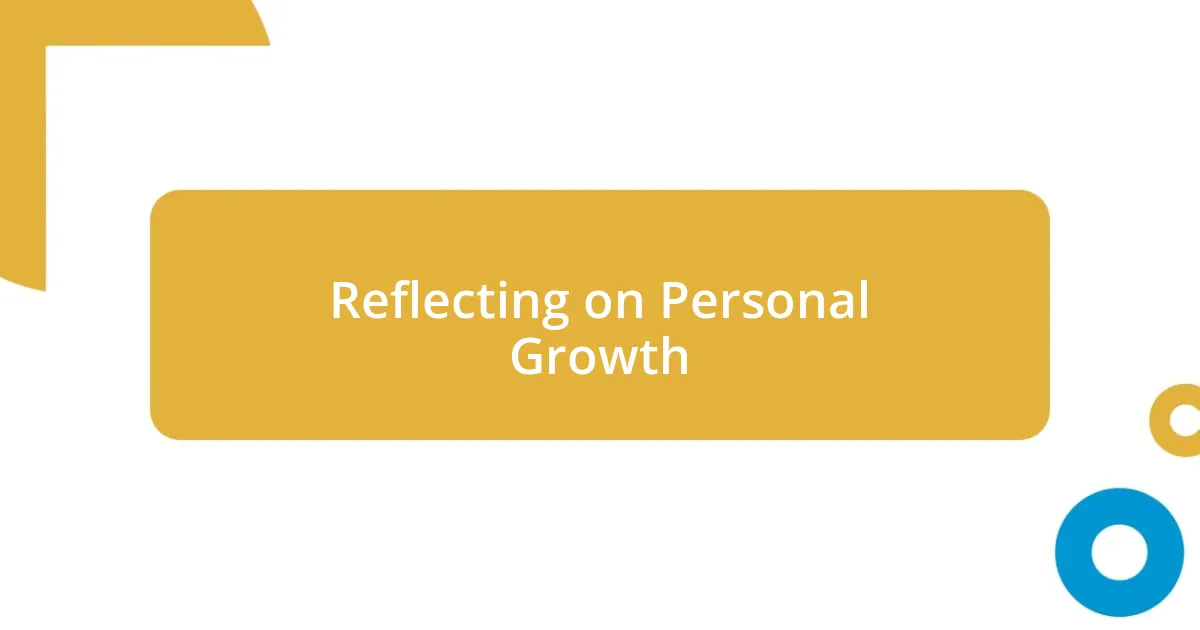
Reflecting on Personal Growth
Reflecting on my personal growth often leads me to moments where I truly understand the impact of what I’ve read. I remember the first time I finished a memoir that delved into the author’s struggles with confidence. As I turned the last page, I felt an unexpected wave of reassurance wash over me, sparking the realization that I wasn’t alone in my own battles. How often do we underestimate the power of sharing our stories? This book reminded me that vulnerability isn’t a weakness; it’s an opportunity for connection and growth.
There’s a certain magic in revisiting texts that have shaped my journey. I recall reading a book on mindfulness that fundamentally changed how I approach daily stressors. The author’s simple yet profound practice of taking a few deep breaths before reacting helped me redefine moments of frustration. I often find myself pausing during a hectic day, allowing that wisdom to guide my responses. Isn’t it fascinating how one insightful practice can ripple through our lives, altering our reactions in significant ways?
Ultimately, personal growth doesn’t always happen in grand epiphanies; sometimes, it’s the subtle shifts that matter most. For instance, after reading a series of articles on emotional intelligence, I began to notice how much I had previously overlooked my own emotions and those of others. Now, I actively seek to understand the feelings that drive behavior, both in myself and in my interactions with others. Can you think of a time when a small idea transformed your perspective? Embracing these enlightening moments is what truly paves the way for continuous self-improvement.
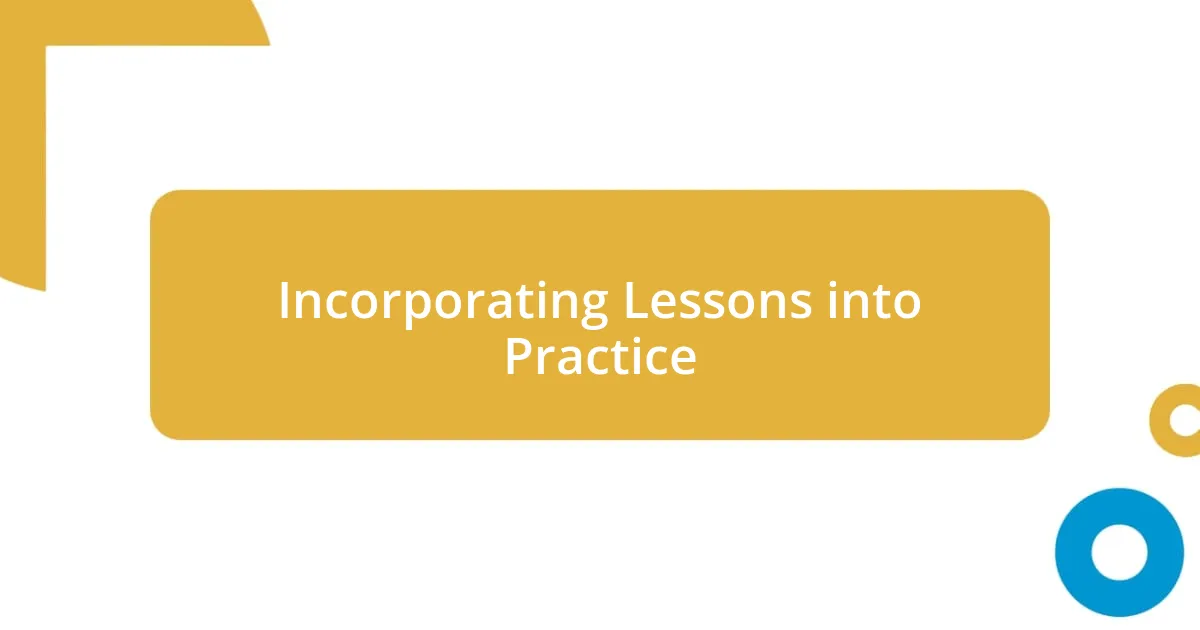
Incorporating Lessons into Practice
Incorporating lessons from others’ work into my practice feels like a transformational journey. I remember dabbling in a creative writing workshop where we analyzed various authors’ techniques. One session focused on how one writer used metaphors to deepen themes, and I found myself experimenting with this in my own stories. It was gratifying to see how a simple tool could enrich my narrative and evoke a more profound emotional response from readers. Have you ever tried a technique you learned from someone else, only to discover it resides perfectly in your style?
Integrating these lessons into my daily routine also means being mindful of how I communicate. After reading a well-crafted piece about the art of listening, I decided to consciously apply this in my conversations. I began summarizing others’ thoughts before responding, ensuring they felt heard. This practice didn’t just improve my communication skills; it forged deeper connections in my relationships. Have you noticed how a small change can create a ripple effect in how you relate to people?
At times, the most impactful lessons come from the most unexpected places. I once stumbled upon an article emphasizing the importance of storytelling, even in data presentation. Inspired, I began framing my reports with narratives that bridged the gap between cold facts and human experience. The feedback was incredible; my colleagues engaged more with the material, and I found joy in storytelling within my professional space. When was the last time a surprising insight reshaped your approach to a task? Embracing these moments fosters a practice of continuous learning and application.
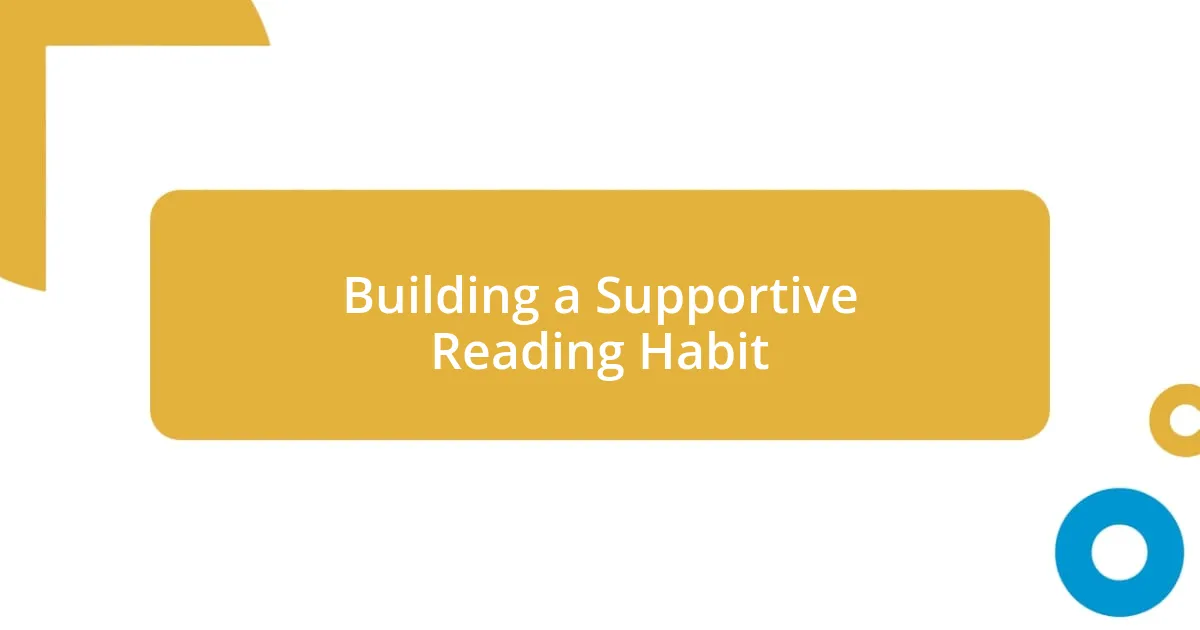
Building a Supportive Reading Habit
Building a supportive reading habit requires intentionality and reflection on the books I choose. I remember when I started setting aside just 15 minutes each day to immerse myself in fiction. That seemingly small commitment turned into a sanctuary for my thoughts, helping me unwind and discover new perspectives. Have you ever noticed how a brief escape into a story can rejuvenate your spirit?
Creating a comfortable environment for reading enhances the experience significantly. I opted for a cozy corner in my home, complete with a soft blanket and a warm cup of tea. This small ritual transformed my reading time into something I genuinely looked forward to. Isn’t it interesting how such simple adjustments can make a profound difference in our engagement with books?
Also, sharing my reading experiences with a close friend has been rewarding. We discuss our favorite passages and insights, creating a unique space for deeper understanding. That exchange not only solidified my learning but also deepened our friendship. When was the last time you shared a reading moment with someone? Those conversations can spark new ideas and create a stronger connection to the material.
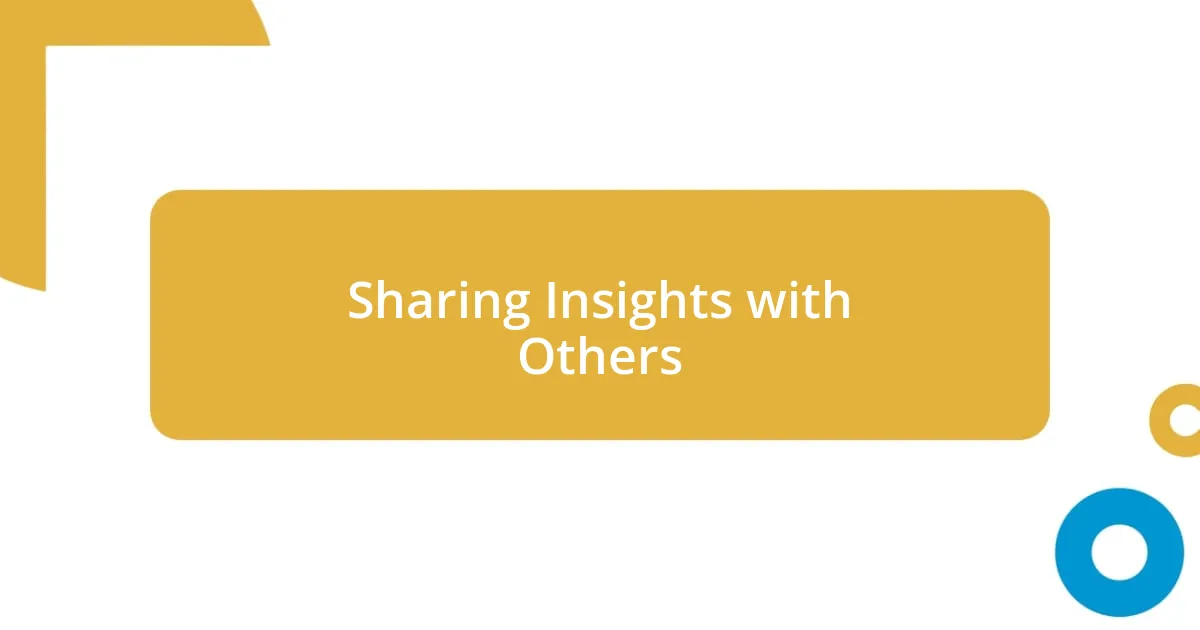
Sharing Insights with Others
Sharing insights with others transforms the solitary act of reading into a collective journey. Just recently, I joined a local book club where we dissected a novel that shook me to my core. As I listened to others’ interpretations, I realized how their perspectives opened up new dimensions of the story that I had completely overlooked. Have you ever found that someone else’s insight made you see something in a book as if it were your first time?
In my experience, facilitating discussions around what I’ve learned brings a surprising depth to the material. I once volunteered to lead a workshop on effective storytelling in business writing. Listening to attendees share their own examples and struggles not only enriched my understanding but illuminated concepts in ways I hadn’t considered. Have you ever facilitated a conversation that illuminated something significant for you?
Moreover, I find that sharing insights isn’t just about exchanging facts; it’s about building community. For instance, I regularly share articles and ideas with a few colleagues who are also passionate about personal development. This informal exchange has not only deepened our professional rapport but also fostered a supportive environment for growth. Have you established a network where sharing knowledge feels organic and exciting? I truly believe that this kind of shared learning leads to not just individual improvement, but a collective uplift that benefits everyone involved.












